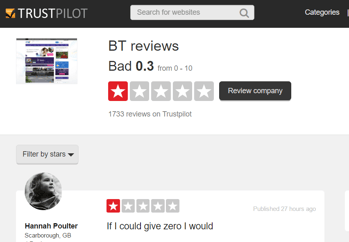 I’ve always chosen the bigger company when given a choice about who to buy a service from. My logic being: 1) economies of scale allow larger companies to offer a less expensive service, 2) the sheer volume of customers means bigger R&D budgets, 3) larger companies have more resource in the event something goes wrong, and 4) because they are bigger, there is more oversight, i.e. they are regulated, ‘watched’ and held publicly accountable by the media.
I’ve always chosen the bigger company when given a choice about who to buy a service from. My logic being: 1) economies of scale allow larger companies to offer a less expensive service, 2) the sheer volume of customers means bigger R&D budgets, 3) larger companies have more resource in the event something goes wrong, and 4) because they are bigger, there is more oversight, i.e. they are regulated, ‘watched’ and held publicly accountable by the media.
In short, they are too big to fail or get it really wrong.
But I have realised this logic is utterly flawed, with British Telecom reminding me exactly how flawed it is. The reality is bigger companies often offer less and charge more, or charge less and offer less (and package it up in attractive marketing), are too large to have developing customer needs feed directly into any sort of R&D (or if they do, it is very slowly), have resource that is too process-oriented to think on their feet, and regulation is typically too weak and too slow to make any difference in the short to medium term.
 British Telecom is currently threatened by new Ofcom recommendations, a one-star rating for Customer Service on Trust Pilot, a network of ‘local specialists’ that fly under the BT Business flag but are actually just a collection of resellers, products that have taken (and ARE taking) years to modernise to competitive levels, and pricing that is dependent on roping businesses into onerous telephony contracts with no way out, regardless of how defunct the service is. It is the epitome of the ‘bigger businesses’ syndrome—it isn’t too big to fail, it is too big to provide a good service too much of the time. From low bandwidth issues, to cookie-cutter approaches, to the poorest customer service run from call centres abroad—it is safe to say that if there are examples of big companies getting it right, BT isn’t one of them.
British Telecom is currently threatened by new Ofcom recommendations, a one-star rating for Customer Service on Trust Pilot, a network of ‘local specialists’ that fly under the BT Business flag but are actually just a collection of resellers, products that have taken (and ARE taking) years to modernise to competitive levels, and pricing that is dependent on roping businesses into onerous telephony contracts with no way out, regardless of how defunct the service is. It is the epitome of the ‘bigger businesses’ syndrome—it isn’t too big to fail, it is too big to provide a good service too much of the time. From low bandwidth issues, to cookie-cutter approaches, to the poorest customer service run from call centres abroad—it is safe to say that if there are examples of big companies getting it right, BT isn’t one of them.
Nevertheless, even with the pandemic issues BT faces, when it comes to things like telecoms, surely BT has some advantage due to infrastructure. Can any company actually compete with BT given BT Openreach own so much of what physically connects everything?
BT Openreach have to sell network connectivity to all providers, including BT. So smaller telecoms companies that invest in high quality network infrastructure, hardware, datacentres, VoIP phone system software, POPs and internet breakout points... and cleverly design their network architecture are technically not at a disadvantage. All providers experience some issues at some point because even when a network is privately owned and run, the provider is still dependent on third parties for certain connections and power. But back-up measures can be put in place, traffic re-routed and most telephony and connectivity disasters fairly quickly addressed. The more nimble the provider, and the better the resiliency of their network, the better chance this has of happening.
The lesson I’ve learned really recently isn’t just “bigger isn’t better”, but rather “niche is better”. Niche just happens to be smaller. Even in the telecoms sector, the service providers that specialise in telephony for SMEs are better able to provide the features and service that 10-200 employee companies need—because they think about it every day. They work at it.
In the last few decades of the 20th century we saw the rise of the multi-national corporation. We saw big corporations become massive, with the largest having hundreds of thousands of employees worldwide. No doubt the shareholders and CEOs of these companies reveled in building an empire that spans the world—a world in which every person can buy a pair of ergonomic Nike shoes, German-engineered luxury car or Silicon-valley designed PC. What many of these companies missed was, Nike shoes may not appeal to me when my local Italian company is making shoes that are stylishly Italian and ergonomically designed. Niche is cooler, it is just for me.
So before you go out shopping this weekend or hire a contractor for your business, think about what you really want. Because in this day in age, what you really want most likely exists. And if it doesn’t… maybe you are in the wrong business.
About VTSL
VTSL is a privately owned telecommunications provider specialising in a VoIP phone system for SMEs. The company was started by two brothers back in 2007 after seeing a niche in the market for a VoIP phone system that addressed the needs of smaller businesses. The company has grown year on year and now is one of the leading VoIP phone system providers in the UK. Learn more at www.vtsl.net.

